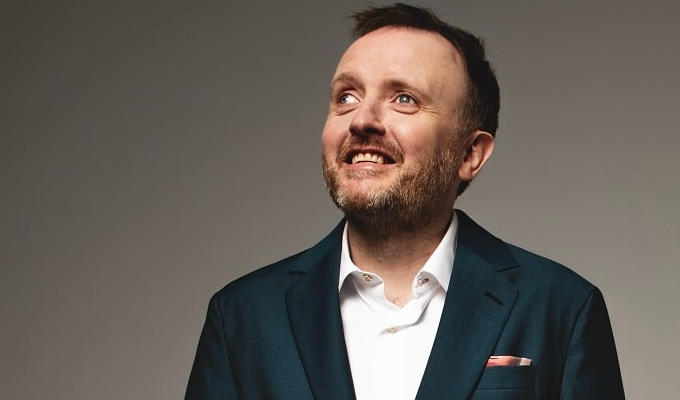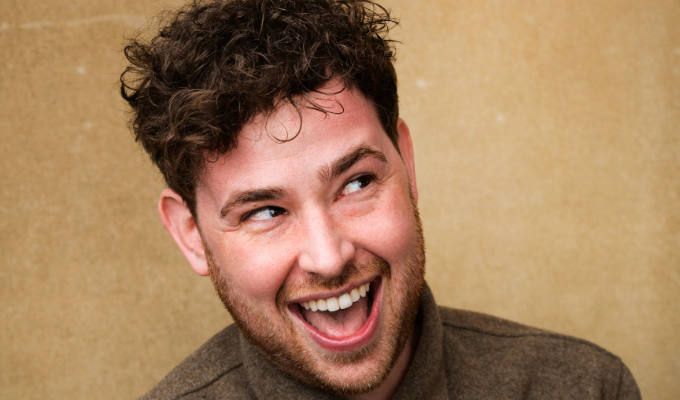
'It's hysterically funny – because it's true'
Armando Iannucci on his new film The Death Of Stalin
 Armando Iannucci has fond memories of the Glasgow Film Theatre. Not only was it where his first film, In The Loop, had its European premiere in 2009. But it's also where, as a 16-year-old schoolboy at the nearby St Aloysius College, he 'bunked off' to see Felicity Kendal host a Q & A about performing Shakespeare.
Armando Iannucci has fond memories of the Glasgow Film Theatre. Not only was it where his first film, In The Loop, had its European premiere in 2009. But it's also where, as a 16-year-old schoolboy at the nearby St Aloysius College, he 'bunked off' to see Felicity Kendal host a Q & A about performing Shakespeare.
Some 37 years later, Iannucci now admits the trip had less to do with his appreciation of The Bard than Kendal being thrice voted 'Rear of the Year’.
He was back at the venerable cinema this week to answer questions about his own career and second film, the blackly hilarious The Death of Stalin, about the prevailing paranoia of the Russian regime and its endemic disappearances and executions.
Iannucci said he 'wanted to get that sense of what it was like living at that time, when people didn't know one day to the next what was going to happen. One minute you were there, the next minute you were gone.
'Like a Harvey Weinstein credit.'
Rasping his best impression of the bearish, disgraced movie executive, Iannucci also mocked the conspiracy of silence around Weinstein's alleged sexual crimes. 'I never knew' he innocently intoned. 'He was always nice to me. When he came in in his bath robe ...'
Yes, emboldened by a rapturous reception for his ensemble dramatic comedy, Iannucci was on impishly mischievous form in his on-stage interview with Janice Forsyth.
The cast is led by Steve Buscemi as a scheming Khruschev, Simon Russell Beale as a terrifying Beria and Jeffrey Tambor as the indecisive, self-regarding Malenkov elevated to the leadership after Stalin's demise. Paul Whitehouse and a wonderful Michael Palin are also in the bickering, infighting politburo, each jockeying for power after Stalin's stroke.

Iannucci claimed that the film had been fun from day one of rehearsals. 'It was great sitting in a little church hall in London, watching Michael Palin, Paul Whitehouse, Simon Russell Beale and Jeffrey Tambor move an old man around [Adrian McLoughlin as Stalin's corpse]' the director enthused. 'And it meant we could feed all their little looks and nuances into the script before we started shooting.
'Because to have a church hall is peanuts compared to shooting. Shooting's the most expensive part of the whole process, hundreds of thousands of pounds each time. You don't want to have 150 people standing around while you discuss a line on set. So we did all that three weeks beforehand.'
The intuitive chemistry between the key players is exemplified by Iannucci's favourite scene, with Palin as Vyacheslav Molotov, the minister of foreign affairs, delivering a Pythonesque speech of such indecision and contradiction that it has the rest of Stalin's inner circle doing a hesitant hokey-cokey of support and opposition to the motion as they struggle to grasp which side he's backing.
Paying warm tribute to Beale and Buscemi's dramatic skills, he noted that the latter would just sit quietly between takes, whereas Whitehouse 'will start singing, very loudly. He'll just do Italian opera really loudly, destroying the carefully balanced tone that we've spent ages creating!'
Tambor meanwhile, is ‘delightful’ – and Iannucci was over the moon to have landed a star of The Larry Sanders Show, one of his 'all-time favourites’. ‘I was so pleased when he read the script and referring to Malenkov said "Yeah, there's a sort of Hank in here". I was very pleased that he was happy to go Hank again.'
Iannucci 'looking at dictators as an idea for a comedy’ while he was showrunning Veep, 'just because I thought there's something in the air … this was pre-pre-Trump, like inter-Farage’. And that’s when the film's producers approached him about directing The Death of Stalin.
Based on a French graphic novel, Iannucci resolved to follow 'the main beats' as much as possible. However, he and his co-writers added other, genuine historical incidents that they uncovered in the course of their research, such as Stalin's son Vasily (played by Rupert Friend), losing the national ice hockey team in an ice storm.
'What appealed to me is the fact that it's true,’ Iannucci explained. 'With our own research we wanted it to be as much as possible the truth of what happened. I think it's absurd and slightly hysterically funny because it is true.'
Nevertheless, it was crucial to strike a balance between humour and acknowledging the millions who suffered under Stalin and his successors.
'There was a lot of work in the scripts and then in the shoot, and there were other scenes we shot that I took out in the edit because I wanted to get that absolutely right,’ he explained. 'I think you probably feel there was more graphic violence than there actually is, because a lot of it is noises off – it's suggested. You don't actually see it until the end.
'The golden rule for me was, although it was comedy, we had to take what happened seriously, we mustn't try to dilute it and we mustn't make fun of it. We had to respect what happened. The comedy of it is the comedy of hysteria that's going on inside, indoors, the meetings these people are having and the decisions they're making. Then we see outside the impact these decisions are having on a vast empire.'
An admirer of Soviet composers of the 1950s, Iannucci was also inspired by 'Russian short stories about the little guy caught up in the big system and just becoming a cog in the machine … I knew that I didn't want to do The Thick Of It in a documentary vérité way, everything being handheld. It was never going to be Dr Zhivago but I did want to stand back and show you the whole of Russia outside and get a sense of that, the scale, that these decisions actually had momentous consequences.
'And this isn't a style thing. But I did go back and look at Charlie Chaplin's The Great Dictator. It's got some of his greatest comic scenes in it but also scenes set in the ghettoes, jokes about gas chambers, it's extraordinary. Because I just wanted to see how he walked that line.'
After Death Of Stalin premiered at the Toronto Film Festival, Iannucci recalled Russian journalists thanking him for not asking the cast to use cod-Soviet accents, which sound like a 'goldfish stuck in the throat'. Rather they use their own mix of British, American and in the case of a scene-stealingJeremy Isaacs as the ebullient Georgy Zhukov, head of the Red Army, channelling 'his inner Sean Bean'.
'I can't understand why, [in films], if they speak English, why do they speak English in a Russian accent?' Iannucci explained. 'It's slow as well, you want comedy to flow … and we wanted them to feel relaxed, we did little bits of improvisation on set as well.
'Also, the Soviet Union was a massive empire. Stalin was from Georgia. Beria was from Georgia. Khrushchev was from Ukraine. So it was a mass of dialects.'
Most of the filming took place in London and the south-east of England. But some scenes were shot on location in Moscow and the Ukraine, close to Chernobyl.
'We went to Kiev for a week,’ Iannucci recalled. 'The crowd disturbances, the crowd outside the funeral, these are all Ukraine. Which is technically at war with Russia but they were quite happy to have Stalin's funeral there. And Red Army soldiers walking the streets.
'They told us Chernobyl is safe. The [local] production company, Radioactive Productions gave me a t-shirt which I can never wear anywhere because it says "Fuck Putin. Film in Ukraine"'.
Suggestions that the modern Kremlin might oppose the film were airily dismissed, however. 'Someone in the Communist Party, who hasn't seen the film, said this sounds like another Western conspiracy to undermine Russia. Which is true actually,’ Iannucci joked.
'I'm not going to say "fake news" because I think somebody did actually say that. But we have a Russian distributor and I think it's coming out there sometime next year.'
Delighted by the fact that The Death of Stalin currently has a 96% rating on Rotten Tomatoes, which 'sounds democratic', Iannucci knew 'this film was going to take me out of my comfort zone and hopefully take the audience out of their comfort zone. There are funny scenes but there are scenes that aren't funny and weren't meant to be. That's a challenge.’
But despite a slight shift from comedy to more dramatic storytelling, the Glaswegian was noticeably reluctant to draw parallels between himself and Woody Allen. And he insisted: ‘I'm not giving up comedy.
‘I think maybe as you get older in a comedy career, you move from doing sketches to sitcom, when then takes you to narrative, then narrative takes you to something more dramatic, which probably takes you to characters. And therefore when you explore characters, you want to actually explore them for real, rather than just make them caricatures.
'You see that with Alan Partridge. We used to write Alan as very broad and now we want him more as a fully fleshed-out human being who has good points and bad points and he still seems, hopefully, as funny. But it's also part of getting older. You want to do something different and not the same old thing.'
With a sci-fi comedy in the works at HBO, Iannucci suggested that his next project was to be Transformers 7. But he also expanded upon his plans for adapting David Copperfield, a film he's writing with Back's Simon Blackwell and Radio 4 favourite John Finnemore.
'I'm reading the book, it's very long,’ he deadpanned. 'We're trying to make the script as much as possible from Dickens's own dialogue and description but fashioning it in our own way. We'll start the casting process quite soon and shoot it May, June next year.
'It's a very funny book, a very human book, the themes are very contemporary ... I don't want to do any Oliver Twist [affects Cockney urchin voice] "buy my cockles and mussels", all that kind of nonsense. London at that time was the centre of the biggest empire the world had ever seen, so it should be like Rome, it should be industrial, big and exciting. These people came from Yarmouth and Devon to London, so they're overpowered by it. And the cast should feel very contemporary and diverse.'
• The Death of Stalin is released next Friday.
Published: 13 Oct 2017






